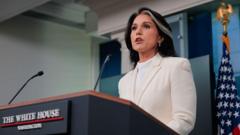Does Gabbard's Declassified Report Reveal Obama's Administration Secrets?

Unpacking Tulsi Gabbard's Declassified Report on the 2016 Election
Tulsi Gabbard, the former U.S. Representative and Director of National Intelligence, has made headlines by declassifying a report that she claims exposes a "treasonous conspiracy" aimed at undermining the 2016 presidential election. This revelation has ignited a fierce debate about the validity of intelligence assessments surrounding Russian interference in the election, particularly those that suggested Russia sought to benefit Donald Trump. The implications of Gabbard's claims are profound, touching on issues of national security, political integrity, and the public's trust in intelligence agencies.
The Background of the Controversy
The central issue at hand is the 2016 presidential election, during which numerous intelligence reports, including a significant assessment by the CIA, concluded that Russian operatives aimed to assist Trump's campaign. Gabbard's report, however, challenges this narrative, claiming that the CIA did not adhere to proper analytic standards and relied on questionable evidence to reach its conclusions.
The declassified document was prepared by Republican members of the House Intelligence Committee and dated September 18, 2020. Gabbard presented it at a White House briefing, claiming it contains "irrefutable evidence" of a manipulated intelligence assessment designed to promote a misleading narrative about Russian interference. As Gabbard stated, this alleged manipulation was orchestrated by officials within the Obama administration.
The Political Ramifications
The release of the report has prompted significant backlash from Democrats, who argue that Gabbard's actions serve as a distraction from ongoing controversies surrounding the Trump administration, particularly the reluctance to release documents related to Jeffrey Epstein. Senator Mark Warner has been vocal in criticizing the administration’s focus on Gabbard's claims, suggesting that it is an attempt to divert attention from more pressing issues, such as accountability regarding Epstein's actions.
Democratic Senator Mark Kelly remarked that the narrative surrounding Gabbard’s report feeds into conspiracy theories that detract from serious discussions about national issues. The political landscape remains tense, as both sides leverage the controversy for their respective agendas.
Analyzing the Claims in the Declassified Report
Gabbard's report identifies what she describes as "egregious weaponization and politicization of intelligence." The document alleges that the CIA based its conclusions on a scant fragment of evidence, which Gabbard argues was insufficient to justify the claims about Russian interference. Critics, however, point out that the overwhelming consensus among U.S. intelligence agencies maintains that Russia did indeed seek to influence the election in favor of Trump.
Among the key authors of the report was Kash Patel, now serving as Trump’s FBI director. This connection raises questions about the motivations behind the report and the integrity of its claims. It also highlights the partisan divisions surrounding intelligence assessments in the current political climate.
Responses from Key Figures
The political fallout from Gabbard's declassification has drawn reactions from key figures across the spectrum. A spokesperson for former President Obama dismissed Gabbard's allegations as "bizarre" and a weak distraction from more pressing issues. This response underscores the continuing tensions between the Trump and Obama administrations, particularly as Trump himself has echoed Gabbard's claims of a conspiracy against him.
Moreover, Patrick Rodenbush, a spokesperson for Obama, emphasized that no released information undermines the conclusion that Russia attempted to influence the election. This statement echoes the findings of a January 2017 intelligence community assessment, which detailed Russian efforts to damage Hillary Clinton’s campaign while boosting Trump’s candidacy.
The Broader Implications of Intelligence Manipulation
The allegations made by Gabbard represent a worrying trend in the politicization of intelligence. When intelligence reports are weaponized for political gain, it undermines the credibility of these assessments and erodes public trust in governmental institutions. In a democracy, the integrity of the intelligence community is paramount for ensuring national security and maintaining public confidence.
As the political climate continues to evolve, the implications of Gabbard's report may reverberate beyond immediate partisan disputes. The ability of intelligence agencies to operate independently and without political influence is essential for their effectiveness. Any perception of bias can lead to skepticism and diminished trust among citizens.
Understanding Russian Interference in Context
To fully grasp the significance of Gabbard's claims, it is essential to revisit the context of Russian interference in the 2016 election. U.S. intelligence agencies have consistently reported that Russia's efforts included the use of social media bot farms to spread misinformation and the hacking of Democratic emails. While these actions aimed to sow discord and undermine confidence in the electoral process, they did not directly manipulate the vote itself.
The findings of a bipartisan Senate intelligence committee in 2020 reinforced these conclusions, affirming that Russia sought to assist Trump's campaign. This bipartisan agreement points to a broader consensus in the intelligence community, which stands in stark contrast to the narrative Gabbard's report attempts to promote.
The Future of Intelligence and Accountability
As Gabbard continues to advocate for investigations into alleged misconduct by Obama administration officials, the future of intelligence accountability remains uncertain. The politicization of intelligence reports can have lasting effects on public perception and trust in governmental institutions. Transparency and accountability are crucial for restoring faith in the intelligence community.
Additionally, as the U.S. approaches future elections, the lessons learned from the 2016 election will be vital in shaping policies and practices around election security and intelligence assessments. Ensuring that intelligence agencies operate without political influence will be paramount in safeguarding the democratic process.
Conclusion: The Path Forward
The release of Tulsi Gabbard's declassified report has sparked a contentious debate about the integrity of intelligence assessments and the implications of Russian interference in the 2016 election. As political factions continue to leverage these allegations for their agendas, the need for transparency and accountability within the intelligence community becomes increasingly urgent.
Moving forward, it is essential for all stakeholders—government officials, intelligence agencies, and the public—to engage in open dialogues about the integrity of intelligence assessments. This can help restore trust and ensure that the lessons of the past inform future policies regarding election security and intelligence operations.
Frequently Asked Questions
What are the main claims made in Tulsi Gabbard's declassified report?
Tulsi Gabbard's report alleges that the CIA did not follow proper analytic standards and based its conclusions about Russian interference on inadequate evidence. She claims this represents a politicization of intelligence aimed at promoting a false narrative against Trump.
How have Democrats responded to Gabbard's declassified report?
Democrats have criticized Gabbard's actions as a distraction from more pressing issues, particularly the ongoing controversy surrounding Jeffrey Epstein. They have pointed out that bipartisan intelligence assessments have consistently concluded that Russia sought to influence the election in favor of Trump.
What is the significance of the bipartisan Senate intelligence committee's findings?
The bipartisan Senate intelligence committee's findings reinforce the conclusion that Russia attempted to influence the 2016 election. This consensus among intelligence agencies contradicts Gabbard's claims and highlights the importance of independent assessments in maintaining public trust.
As we reflect on the implications of Gabbard’s report and the broader discussion around intelligence, it is crucial to consider how we can ensure transparency and accountability in our government. How can we balance national security with the need for public trust in our institutions? #IntelligenceIntegrity #ElectionSecurity #PoliticalAccountability
```Published: 2025-07-23 21:28:04 | Category: wales



